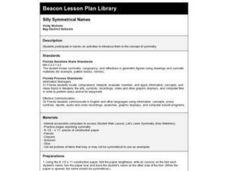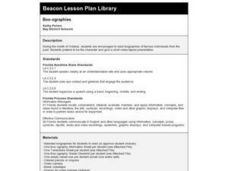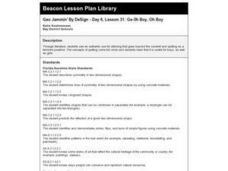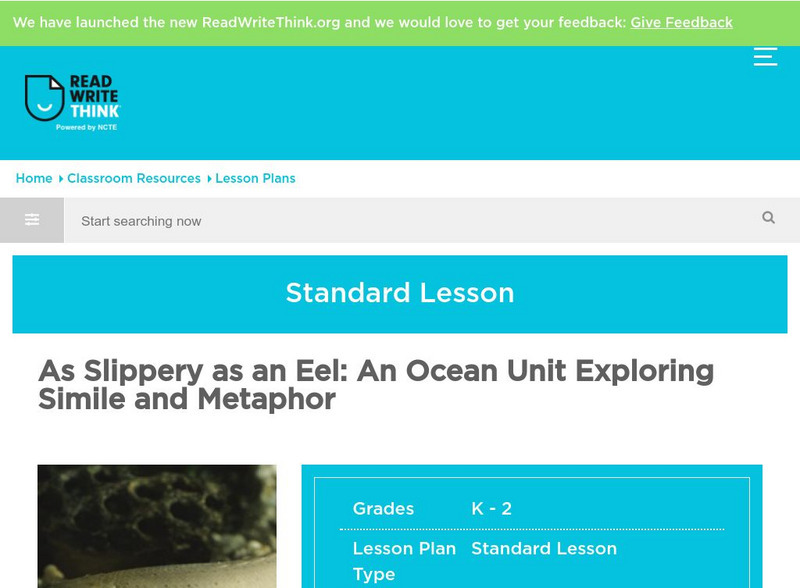Curated OER
Silly Symmetrical Names
Fourth graders participate in hands-on activities to introduce them to the concept of symmetry. They make a silly symmetrical picture out of their names after gluing them onto a larger sheet of construction paper. This is a really...
Curated OER
Boo-ographies
Pupils read biographies of famous people and create a presentation where they become the characters they have read and researched. They create tombstones for the people they have researched.
Curated OER
Perspectives on Written & Spoken English
Students explore issues surrounding language norms, including the distinction between prescriptive and descriptive norms, the differences between norms for spoken English and those for written English, how word meanings change, and...
Curated OER
A Creative Presentation
Young scholars read chapter books by Gary Paulsen. In groups, they identify imagery presented in the book. Students locate 10 quotes, categorize each quote into one of the five senses, and then organize it and create a display of their...
Curated OER
Finding Yourself Through Autobiography
Students read the writings of individuals whom they know and admire. They see that writing about themselves is worthwhile and important and helps them become better writers. They share their own life experiences, write about personal...
Curated OER
Manipulative Mania
Students explore tangram vocabulary and tangram designs, creating an art design that contains various geometric parts. They complete a checklist titled, Important Thing About a Quilt Design.
Curated OER
Ge-Oh Boy, Oh Boy
Students listen to the book, Sam Johnson and the Blue Ribbon Quilt and discuss the art of quilting. They examine various symmetrical sewing designs, and identify reflection pieces, slides, and flips.
Curated OER
Geo Jammin' By DeSign - Day 1, Lesson 6: Quilt Story
Learners recognize that quilts are created by geometric components. They examine how quilts are an artistic art form that show the cultural heritage of the people who make them.
Curated OER
Whodunit?
First graders choose a community member, show how to resolve a conflict, and trade writing with a classmate. They match symbols that might represent the community members they have chosen.
Curated OER
Social Studies: What Is Folklife?
Students read an essay about folklife and record their thoughts in journals. After discussing the terms associated with the topic, they complete worksheets on types of folklife, pop, elite, and folk cultures. Depending on the age group,...
Curated OER
Sorting the Loyalist Documents
Students organize the Canadian Loyalist primary source documents and add more information to their primary source document concept maps.
Curated OER
Geo Jammin' By DeSign - Day 2, Lesson 11: A Stitch in Time
Students investigate the culturally artistic value of quilts, the importance of trade in meeting basic needs, and the conservation of natural resources.
ReadWriteThink
Read Write Think: Figurative Language Awards Ceremony
Contains plans for five to seven lessons that teach about figurative language like similes, metaphors, and personification by asking students to write award acceptance speeches that incorporate them. In addition to objectives and...
ReadWriteThink
Read Write Think: Finding Figurative Language in the Phantom Tollbooth
Contains plans for four lessons that use The Phantom Tollbooth by Norton Juster to teach about figurative language. In addition to objectives and standards, this instructional plan contains links to handouts and to sites used in the...
ReadWriteThink
Read Write Think: An Ocean Unit Exploring Simile and Metaphor
Contains plans for four lessons that teach learners about similes and metaphors using ocean themed resources. In addition to objectives and standards, this instructional plan contains links to sites used in the lessons as well as...
Writing Fix
Writing Fix: An I Pod Inspired Poetry Lesson: Paradox Poetry
Jack Johnson's "Inaudible Melodies" creates an interesting paradox of how society perceives itself versus the reality of how society really behaves. After listening to a second song using paradox in order to further understand the...
ReadWriteThink
Read Write Think: A Close Reading of Seamus Heaney's "Blackberry Picking"
Contains plans for two lessons that explain an inductive method for analyzing poetry. Seamus Heaney's "Blackberry Picking" is analyzed using this model as an example, although the method can be used on a variety of poems. In addition to...
ReadWriteThink
Read Write Think: Writing Abc Books to Enhance Reading Comprehension
Contains plans for four lessons that are adaptable to many texts that learners may be reading. Students analyze the text for literary elements such as characters, setting, figures of speech, and themes, and then publish their findings in...
Alabama Learning Exchange
Alex: Producing Poetic Podcasts (Hey, That's Alliteration!)
In this culminating lesson plan for a poetry unit, learners will create a video podcast that summarizes a specific poem, analyzes the poet's use of literary elements, and infers the meaning of the poem (theme). The podcast must use a...
PBS
Wnet: Thirteen: I Have a Metaphor
This lesson not only examines the message of Dr. King, but also the words themselves. This is a lesson in identifying the literary devices that he used in his "I Have a Dream" Speech. It will introduce the following literary devices:...



















